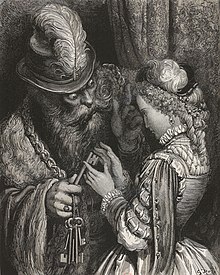Bluebeard's Castle
| Bluebeard's Castle | |
|---|---|
| Opera by Béla Bartók | |

Bluebeard and Judith in an illustration by Gustave Doré for Perrault's tale
|
|
| Native title | Template:Lang hu |
| Librettist | Béla Balázs |
| Language | Hungarian |
| Based on | French tale "La Barbe bleue" by Charles Perrault |
| Premiere | 24 May 1918 Royal Hungarian Opera House, Budapest |
Bluebeard's Castle (Hungarian: A kékszakállú herceg vára; literally: The Blue-Bearded Duke's Castle) is a one-act opera by Hungarian composer Béla Bartók. The libretto was written by Béla Balázs, a poet and friend of the composer, and is written in Hungarian, based on the French literary tale "La Barbe bleue" by Charles Perrault. The opera lasts only a little over an hour and there are only two singing characters onstage: Bluebeard (Kékszakállú), and his new wife Judith (Judit ); the two have just eloped and Judith is coming home to Bluebeard's castle for the first time.
Bluebeard's Castle was composed in 1911 (with modifications made in 1912 and a new ending added in 1917) and first performed on 24 May 1918 in at the Royal Hungarian Opera House in Budapest. Universal Edition published the vocal (1921) and full score (1925). The Boosey & Hawkes full score includes only the German and English singing translations while the Dover edition reproduces the Universal Edition Hungarian/German vocal score (with page numbers beginning at 1 instead of 5). A revision of the UE vocal score in 1963 added a new German translation by Wilhelm Ziegler, but seems not to have corrected any errata. Universal Edition and Bartók Records has published a new edition of the work in 2005 with new English translation by Peter Bartók, accompanied by extensive errata list.
Balázs originally conceived the libretto for his roommate Zoltán Kodály in 1908, and wrote it during the following two years. It was first published serially in 1910 with a joint dedication to Kodály and Bartók, and in 1912 appeared with the prologue in the collection "Mysteries". Bartók was motivated to complete the opera in 1911 by the closing date of the Ferenc Erkel Prize competition, for which it was duly entered. A second competition, organised by the music publishers Rózsavölgyi and with a closing date in 1912, encouraged Bartók to make some modifications to the work in order to submit it to the Rózsavölgyi competition.
...
Wikipedia
